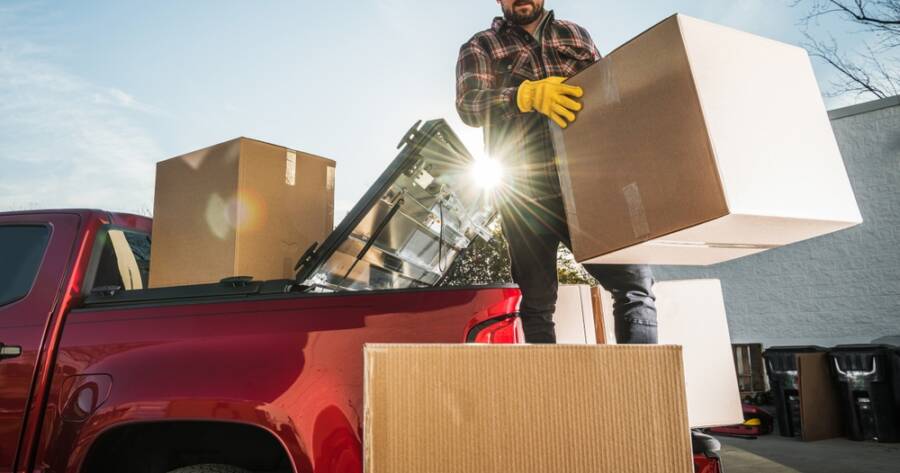Knowing the difference between payload and towing capacity is essential if you own or plan to buy a truck. The two terms are often confused, but each affects what your vehicle can safely carry or pull. Using them the wrong way could lead to damage, safety issues, or a costly mistake down the road.
What Is Payload Capacity?
Payload refers to the total weight your truck can carry in and on the vehicle itself. This includes everything from cargo in the bed to passengers in the cab. It also covers any tools, fuel, or add-ons that increase the weight sitting directly on the frame.
To calculate payload, you subtract the truck’s curb weight from its gross vehicle weight rating (GVWR). The GVWR is set by the manufacturer and includes the maximum total weight your vehicle can safely carry. If you go over your payload capacity, the suspension, brakes, and tires all experience more stress than they’re designed to handle. This can lead to premature wear—or even equipment failure.
It’s important to remember that aftermarket modifications, like toolboxes or racks, also count toward payload. Even routine items such as full fuel tanks or passengers will reduce your remaining capacity. Always consider the combined total to stay within safe limits.
What Is Towing Capacity?
Towing capacity is the maximum weight your truck can pull behind it using a hitch. This could include trailers, boats, campers, or other vehicles. Unlike payload, which applies to what’s on the truck, towing deals with what’s being pulled.
To figure out towing capacity, you need to understand your vehicle’s gross combined weight rating (GCWR). This number includes the weight of your fully loaded truck and whatever it’s towing. When the weight of the trailer and the loaded truck reaches the GCWR, you’re at the towing limit.
Towing capacity also depends on how the trailer is connected and whether you’re using a bumper hitch, fifth-wheel, or gooseneck setup. Each one handles weight differently and is suited for specific types of loads. The trailer’s tongue weight—the force pushing down on the hitch—also plays a role. Too much tongue weight can make steering difficult and stress the rear suspension.
Why These Two Ratings Are Easy to Confuse
Many drivers think that if a truck can tow a certain weight, it should easily carry that same amount. But payload and towing are measured differently and involve separate parts of the vehicle. A truck might tow a large trailer with ease but struggle with heavy loads placed in its bed.
Some pickups are built to haul heavier in-bed loads, while others are better at towing longer distances. For example, a truck with a powerful engine may tow well but still have a modest payload if it’s not built for carrying. It’s easy to misunderstand these ratings when looking at truck ads or spec sheets, especially when marketing language uses terms like “maximum capability” without clear detail.
To avoid confusion, always check the owner’s manual or look for a label inside the driver’s door. This sticker usually lists the GVWR, curb weight, and other key ratings. From there, you can do the math and understand the true limits of your vehicle.
The Real-World Impact of Exceeding Limits
Ignoring payload or towing capacity doesn’t just risk your truck—it can affect your safety and the safety of others on the road. Too much weight in the bed can make the vehicle harder to control or stop. It may even cause suspension failure or blow out your tires.
Likewise, towing more than your truck can handle increases strain on the engine, transmission, and brakes. It can cause trailer sway, poor steering, and longer stopping distances. Overloading is also a common reason why trailer hitches fail. In some cases, you could also void warranties or face legal consequences if an accident occurs due to excess weight.
It’s also worth noting that some states have laws about weight limits, trailer brakes, and hitch types. Being within limits isn’t just smart—it’s required in many places.
Choose the Right Truck for the Job
If you plan to tow or haul often, it’s worth comparing several truck options carefully. Consider what you’ll carry most frequently, and whether you need a higher towing rating or larger payload. Diesel engines tend to offer better towing strength, while lighter-duty trucks may have better in-bed capacity.
Don’t assume that a bigger or more expensive truck is always better. The best choice depends on your needs. You may want to speak with a dealer or a mechanic to get advice based on real-world use.
Know Before You Load
Understanding payload and towing capacity helps you get the most out of your truck while staying safe. These numbers aren’t just technical details—they’re key to smart ownership.
Whether you’re towing a trailer across the country or hauling supplies for work, knowing your limits can protect both your truck and your peace of mind.

